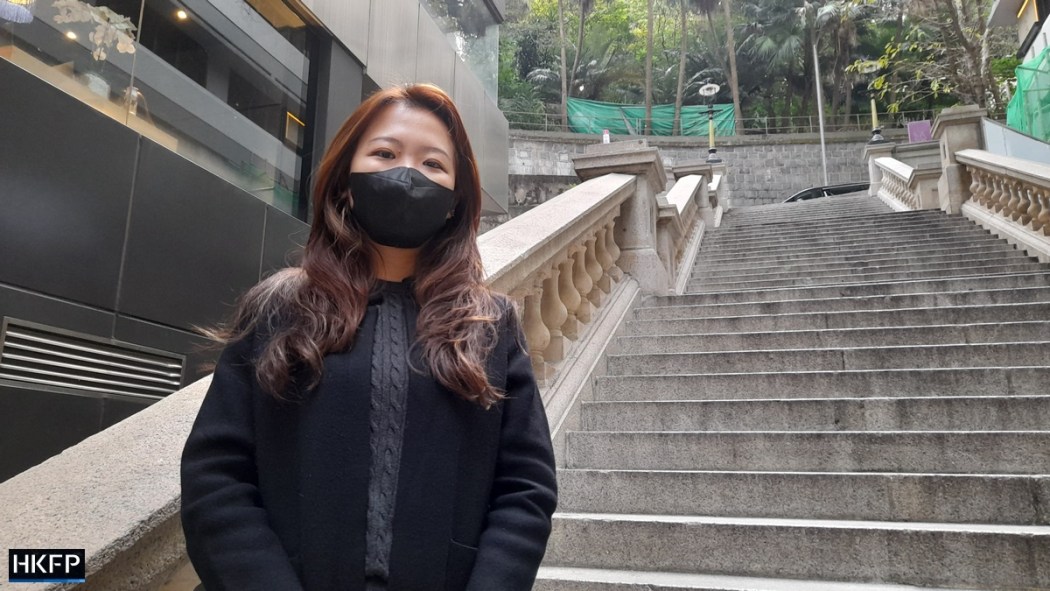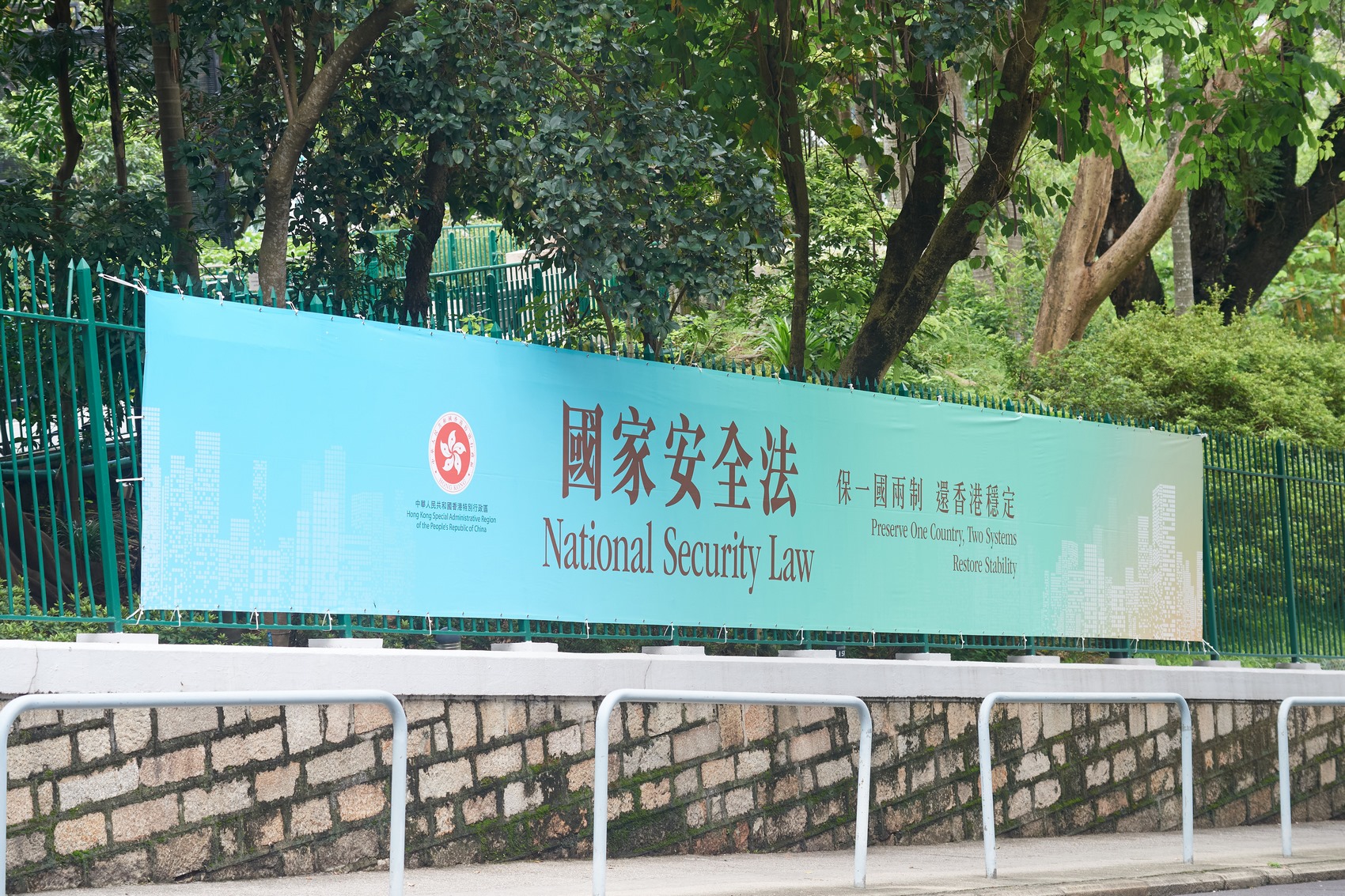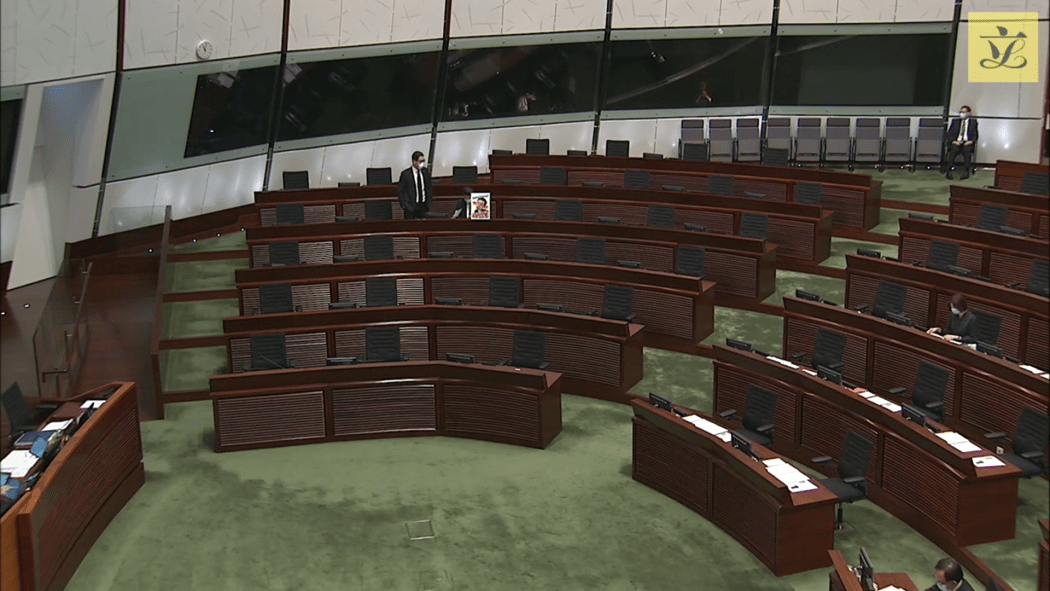Barrister Jessica Leung says 2020 has left many Hongkongers downcast about the city’s future. Reflecting on developments in the judicial system, she understands why.
Courts came under increasing political pressure as cases relating to the 2019 protests were heard. State-run newspapers Ta Kung Pao and Wen Wei Po lambasted a judge who ruled that Hong Kong police officers must display their badge numbers while on duty.

Pressure on the courts also appeared to come from the executive, with Chief Executive Carrie Lam defending the official stance that there is no separation of powers under Hong Kong’s “executive-led” system. The government, however, has given repeated assurances that the courts still enjoy judicial independence.
The leading Civic Party member told HKFP in an interview that Lam’s comments went against the foundations of the common law system. “From what we learned from our common law education, separation of powers is literally separation,” she said, adding that there should be no conditions placed on the courts’ independence.
“Judicial independence should not be built on any premises. We should not set any assumptions on judicial independence.”
“What is meant by independence is to be independent, regardless of your beliefs or regardless of whether you are patriotic enough,” she said, referring to comments from mainland officials that “only patriotic people” should serve in Hong Kong’s legal system.
Leung stressed that the separation of powers as part of a system of “checks and balances” was all the more crucial, “especially when we see that the Legislative Council is not doing its function properly.” The legislature now has no effective opposition after the entire democratic camp resigned in solidarity with four of their ousted colleagues in mid-November.
An ‘aggressive’ DoJ
A key factor in the preservation or erosion of judicial independence is how the Department of Justice (DoJ) pursues cases, Leung said. “The judiciary cannot actively come out to comment on… current issues. The judiciary can only take action when cases come before the court. So if the DoJ does something aggressive — say appeals or lays charges — the courts have to hear it.”
Leung said the crux of the problem arose in circumstances where the department doggedly pursued cases with a political agenda. “The role of the DoJ is to present the case fairly. The role of the DoJ is not to convict,” she said “But what I observe is that quite a lot of representatives from the DoJ are trying to target certain defendants.”

“They have a lot of prosecutions that sound a little bit groundless,” Leung continued. This influx of politically-motivated and tenuous cases meant that “it’s a bit difficult for the legal system to run as smoothly as before.”
Within the last six months, the DoJ has launched multiple appeals against court decisions in protest-related cases, including the case of eight individuals arrested near a protest in Wan Chai last August. The judge acquitted the group of “rioting,” holding that the prosecution had failed to prove they had in fact taken part in the protests.
One of the defendants, a social worker who worked as an emotional support person and liaised with protesters and police on the frontlines, had charges withdrawn due to a lack of prima facie evidence. The DOJ has also appealed against that decision.
“It looks like the DoJ is trying to look for… reinterpretation of the legal principles of ‘riot.’ What we understand is that… when we talk about taking part in a riot or an unlawful assembly, we mean that he or she really has a role and [played] a part in the assembly or riot,” Leung explained.
“But what the DoJ is trying to do is criminalise those who are at the scene, who may not be really taking part in it.”

The DoJ’s “very active role” in appealing against protest-related court decisions also erodes the rule of law, Leung said. “One of the factors of the rule of law is that the law has to be certain,” she said, saying that particular actions taken last year should have the same legal consequences this year.
“Now, the DoJ is now re-writing or suggesting another way of legal interpretation. So is the law really that certain?” she asked.
Leung added that the need to question the rule of law was itself a sign that it is faltering.
“The day we cast doubt on the rule of law is the day that the rule of law may not be functioning that well. Because the rule of law should be a self-regulating system – with legal certainty, openness and fairness. But the day people are losing confidence in it, it means that it is not functioning that well.”
Increased uncertainty
Uncertainty in Hong Kong’s laws was exacerbated by Beijing’s introduction of the national security law on June 30. For Leung, this increased uncertainty represented the gravest impact of the security law. She referred to decisions on bail and the freezing of assets.
“In our common law criminal system person, a person is presumed to have bail unless he or she has exceptional circumstances including the risk of absconding, the risk of interfering with a witness… or re-offending while on bail,” the barrister said. “But in the national security law, it looks like the presumption of [granting] bail is no longer here.”

Article 42 of the law provides that no bail be granted “unless the judge has sufficient grounds for believing that the criminal suspect or defendant will not continue to commit acts endangering national security,” — rebutting the usual presumption under common law.
Since July, arrested prominent pro-democracy figures including Apple Daily founder Jimmy Lai and People Power activist Tam Tak-chi have been denied bail.
Leung added that this uncertainty extended to the seemingly arbitrary freezing of assets by authorities. In early December, former opposition lawmaker Ted Hui said his HSBC account and other accounts, alongside those of his family members, had been frozen, unfrozen and refrozen within the space of 48 hours.
Police later said the freeze order only related to a sum of HK$850,000 in connection with a money-laundering probe after Hui fled to the UK via Denmark.
“From Ted Hui’s example, the government can freeze, defreeze, freeze… and we don’t know why. Does this case really [give] people confidence in the national security law?” Leung asked.

When asked whether she herself felt pressure under the law, Leung said she would be lying if she said she did not feel threatened. “It’s not just the security law, but also pressure from the institutions… as long as you are doing something that looks like you are in opposition, I do think there will be pressure.”
Leung said she could not rule out the possibility that human rights lawyers and criminal lawyers may become targets under the law, similar to the situation in mainland China. “We cannot rule out any possibilities, as long as we are standing up for freedom or justice.”
Contemplating the future of the legal profession, Leung said it was a matter of lawyers carrying on as best they can. “We have to strive to survive… It may be a difficult life for human rights lawyers or criminal lawyers like us. But as long as we can do our duty, I think we will do it until the very last day.”
Fighting for what’s left
Despite the gloom, Leung told HKFP she would stay on to fight to protect what was left of Hong Kong’s diminishing freedoms.
Having qualified as a barrister last year, the 27-year-old made her debut in politics this May. She originally planned to run in the now-postponed legislative elections and was elected last month to the Civic Party’s executive council.

When asked about the point of engaging in politics at a time when the legislature has been stripped of an opposition, Leung said there were still reasons to continue speaking out. “After the movement last year, it looks a bit like Hong Kong people… may feel a bit hopeless,” she said.
“But to me, I think there’s nothing hopeless, as long as we have the values and the belief that we need to uphold our justice and democracies. So at this difficult point of time, I think I should still stand up and stand out.”
Despite having no representative within the legislature, Leung said the Civic Party still had influence within the community and on district councils and there were still modest aims to strive for. “To preserve what we can preserve… In the upcoming years, I do foresee there could be a lot of policies that affect Hongkongers — say, privacy issues… and telecom issues.”
It was important to pre-empt future attacks on existing freedoms, she said.

Leung undertook to speak out and raise public awareness against government “tricks” to restrict Hongkongers’ freedoms. “The easiest example is like the [Covid-related] prohibition against group gatherings… what we can see is that those prohibitions or those fixed penalties are against people having gatherings or public meetings for some political purpose.”
“So we wish that we could reveal or let the public know that we should not tolerate… the tricks in the government’s policy nowadays.”
Leung added that she was investigating concerns over state surveillance. “I’m now starting to read through some policy issues like…the LeaveHomeSafe app. Is it a prelude to tracking or privacy issues?” she said, referring to the government-issued tracing app aimed at curbing local Covid-19 infections.
“We don’t know how much the government wants to know about us.”
Why stay?
Even though pro-democracy dissidents continue to flee, Leung told HKFP she could not bear to leave her home city. “I do have fellow colleagues migrating to the UK or leaving Hong Kong, but I also see a lot of us staying here and… trying our best,” she said.
“I am not saying [those who leave] are not working for Hong Kong. But for me, I have a very strong sense… of belonging to Hong Kong and I love this place a lot. Emotionally, I cannot withstand the pain and the feeling of saying goodbye from here — physically…. I do think that some of us do need to stay here.”

Despite her commitment to staying on, the barrister struggles to be optimistic about the coming year.
“I cannot imagine what’s the best case. But the worst case is that a lot of us will face arrest, or criminal consequences or a lot of pressure. I’m not just talking about lawyers. The fight is not just for lawyers or certain professionals, but for everyone in Hong Kong… because the pressure could be from all walks of life because of the influence from China.”
Nonetheless, Leung said she still saw hope. “I do see hope and empowerment after 2014 and 2019. This is the uniqueness that Hongkongers have. Despite a lot of difficulties and a lot of opposition from the government, Hong Kong people… never give up.”
“What we fight and what we preserve is the energy of Hongkongers. I think only Hongkongers can say that we’ve lost. No one else can declare that we’ve lost, unless we give up. This is what a society should be,” she continued.
“There’s no definite answer as to who is winning and who is losing. It is only the case that we’ve truly lost if we all give up.”
Support HKFP | Policies & Ethics | Error/typo? | Contact Us | Newsletter | Transparency & Annual Report | Apps
Help safeguard press freedom & keep HKFP free for all readers by supporting our team
























